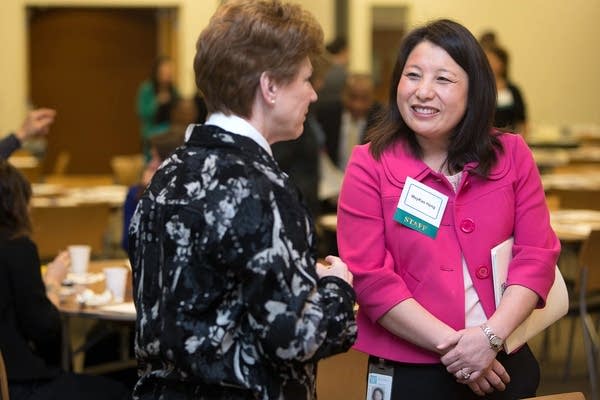Wilder CEO sounds alarm on racial disparities
Go Deeper.
Create an account or log in to save stories.
Like this?
Thanks for liking this story! We have added it to a list of your favorite stories.

MayKao Hang doesn't look like the average Minnesota CEO, especially when she's mingling with other executives.
"I would venture to guess that maybe for a lot of people, I'm the first Asian person they've actually had a relationship with," Hang said with a laugh. "At the CEO level, how many are there? Well, there aren't that many."
About three years ago, Hang became president and CEO of the Amherst H. Wilder Foundation, a century-old nonprofit that delivers social services to vulnerable families in the eastern part of the Twin Cities metropolitan area. She is the first woman and first person of color to head the St. Paul institution.
Through a group known as the Itasca Project, Hang is helping lead a coalition of mostly business leaders tackle the disparity of opportunity between whites and minorities in hiring. For nearly a decade, the group has been warning about the growing divide, which also touches on class.
Turn Up Your Support
MPR News helps you turn down the noise and build shared understanding. Turn up your support for this public resource and keep trusted journalism accessible to all.
"I think one of the most shocking things to me is how a lot of white people don't see race... I'm like, 'Really? Because I see it.'"
Minnesota's stark unemployment gap between whites and people of color continues to vex civic leaders. In the Twin Cities, for example, blacks are more than three times as likely as whites to be unemployed, a disparity that ranks the region the worst of 25 large metropolitan areas included in a national study published last year.
Leaders of Minnesota's nonprofit and business communities warn that the region's economy will suffer if the gap persists. Among them is the Ivy League-educated Hang, who may seem like an outlier to the narrative that Minnesota needs to level the playing field for people of color.
But Hang is still ringing those warning bells as she tries to convince other Minnesotans that the way many see the state -- as an egalitarian society where everyone can succeed -- needs a reality check.
"I think the bragging's got to quit," she said. "I think the truth-telling is starting. I think a lot of people are worried, and I think the data speaks for itself."
Several years ago, the Itasca Project published a report showing that people of color are more likely to be homeless, victims of crime, underemployed, and die early than whites.
These are confounding statistics in a place that prides itself on a highly educated work force and strong growth rate. They trouble civic leaders who say there aren't enough skilled workers in the pipeline, many of them young and diverse, to fill the jobs vacated by aging seniors.
The question of why whites find work at higher rates than their nonwhite peers is complex. But research by the Washington D.C.-based Economic Policy Institute found that blacks in Minnesota with similar education levels as whites were much more likely to be unemployed.
Hang doesn't have all the answers, but thinks the state needs to find out what's really going on. She said change begins with bringing a more inclusive circle to the table.
"I think one of the most shocking things to me is how a lot of white people don't see race," she said. "I'm like, 'Really? Because I see it.' When something derogatory happens to me, when I'm not listened to, or when people say absurd things to me about my race, or about being an Asian woman or a leader of color, I'm just constantly shocked that people are that clueless."

Hang said many decision-makers have a big blind spot when it comes to race, one that she said has to do with never having experienced discrimination. Others, she said, try to stick with a single solution to fit all people.
Many Minnesotans find it uncomfortable to discuss race. But the 40-year-old Hang learned about race early on while growing up in St. Paul public housing, where she said white and black kids used to beat her up with sticks because they didn't like their new Hmong neighbors.
Hang eventually rose from poverty and graduated from Brown University. She credits a strong safety net of welfare and free school lunches -- and a loving father whose way of protecting her was building a five-foot fence around the family's yard.
These days, Hang is telling her story more often, as she did this week at a breakfast of mostly white nonprofit and business leaders interested in closing Minnesota's gaps.
"Don't let me be the only person who talks about race," she said. "Don't let be me the only person who talks about why diversity is important. Your voices, coming from different places, as white people, as people who sit on the board -- say something."
Dear reader,
Your voice matters. And we want to hear it.
Will you help shape the future of Minnesota Public Radio by taking our short Listener Survey?
It only takes a few minutes, and your input helps us serve you better—whether it’s news, culture, or the conversations that matter most to Minnesotans.





